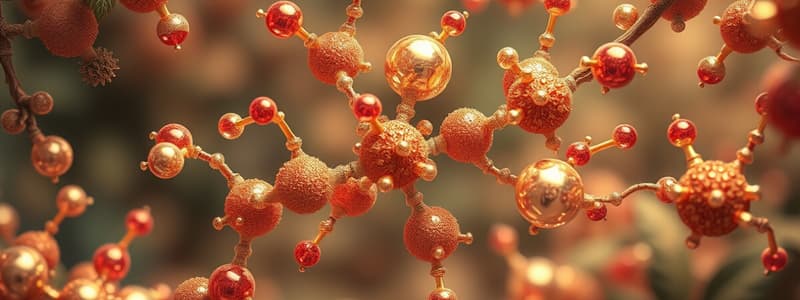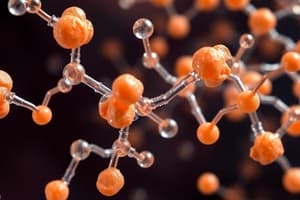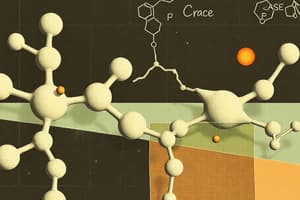Podcast
Questions and Answers
What are lipids?
What are lipids?
- Only waxes and steroids
- Compounds that are soluble in water
- Compounds that are insoluble in water but soluble in organic solvents (correct)
- Only fats and oils
What are carbohydrates?
What are carbohydrates?
Organic compounds consisting of carbon, hydrogen, and oxygen, usually in a ratio.
What is a biological macromolecule?
What is a biological macromolecule?
A large molecule contrasted with micromolecules, often found in biological systems.
What are nucleic acids?
What are nucleic acids?
What is a protein?
What is a protein?
What is a monomer?
What is a monomer?
What is a polymer?
What is a polymer?
What are lipids?
What are lipids?
What are polymers?
What are polymers?
What are protein enzymes?
What are protein enzymes?
What are the elements in proteins?
What are the elements in proteins?
Flashcards are hidden until you start studying
Study Notes
Lipids
- Organic compounds that are insoluble in water yet soluble in organic solvents.
- Include natural oils, waxes, and steroids.
- Key types: fats, oils, and waxes.
Carbohydrates
- Organic compounds made up of carbon, hydrogen, and oxygen, typically in a ratio of 1:2:1.
- Commonly serve as energy sources and structural components in living organisms.
Biological Macromolecules
- Large complex molecules essential for biological functions; contrast with smaller micromolecules.
- Four main types: proteins, nucleic acids, carbohydrates, and lipids.
Nucleic Acids
- Complex compounds found in all living cells and viruses.
- Composed of nucleotides, containing purines, pyrimidines, carbohydrates, and phosphoric acid.
Proteins
- Substances consisting of amino acids, which are vital for various biological functions.
- Composed of carbon, hydrogen, oxygen, and nitrogen.
Monomers
- Small molecules that can join together through chemical bonds to form larger structures known as polymers.
- Serve as the building blocks of biological macromolecules.
Polymers
- Compounds formed by linking repeated simple monomers into larger molecules.
- Naturally occurring (like DNA and proteins) or synthetic (like plastics).
Lipid Overview
- Essential for storing energy, signaling, and acting as structural components of cell membranes.
Polymer Overview
- Polymers can be natural (e.g., proteins, starch) or synthetic (e.g., nylon, plastics) and play critical roles in various fields, including biology and materials science.
Protein Enzymes
- Proteins that act as catalysts to accelerate biochemical reactions in living organisms.
- Essential for metabolic processes and regulation within cells.
Elements of Life
- Key elements include carbon, hydrogen, nitrogen, oxygen, phosphorous, and sulfur, crucial for forming biological macromolecules.
Studying That Suits You
Use AI to generate personalized quizzes and flashcards to suit your learning preferences.




